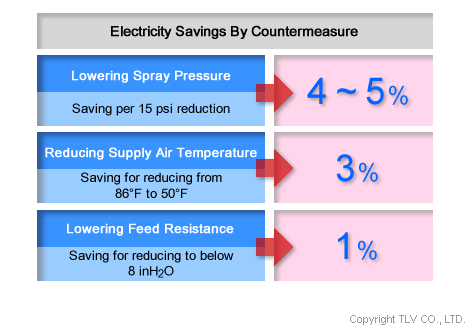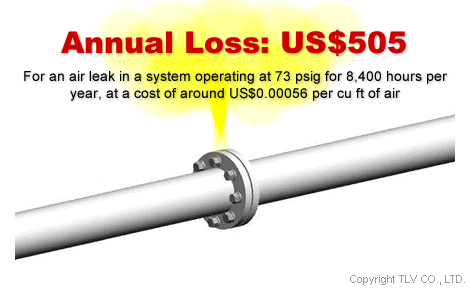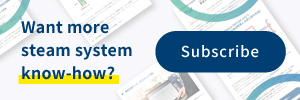- Home
- Steam Resources
- Steam Theory
- Air Compressor Energy Saving Tips
Energy Efficiency
Air Compressor Energy Saving Tips
Efforts to Reduce the Electrical Energy Used by Air Compressors
Compressed air is used for various purposes, some of which include power generation, transportation, paint spraying, instrumentation/controls, and cleaning. Because of its versatility, it is used not only in industrial plants but also in office buildings, hospitals, and other types of facilities.
Air compressors play an important role in each of these facilities, and their energy consumption can make up a significant percentage of total energy use. Since compressed air is often the most expensive utility, operating costs can be significant. This is why, in recent years, increasing numbers of plants and facilities have started taking steps to reduce the amount of energy used by air compressors.
Methods of Reducing Air Compressor Energy Use
What should general users do to reduce the energy used by air compressors? TLV recommends taking the following steps.
1. Create and manage an air compressor operating schedule.
Identify idle periods when the compressor can be shutdown.
2. Fix existing system leaks.
Large leaks will be audible, while smaller leaks will need to be identified by ultrasonic leak detection technology.
3. Examine whether spray pressure can be reduced.
A spray pressure reduction of 0.1 MPa (1 bar, 15 psi) can lower electrical energy consumed by the air compressor by approximately 4 - 5% (depending on the type of air compressor and number of years in use). This drop in pressure can also lead to a decline the amount of compressed air lost from unrepaired leaks.
4. Use cooler supply air.
For example, drawing in 10 °C (50 °F) air from outside the facility rather than 30 °C (86 °F) air from inside can reduce the air compressor’s energy consumption by 3%.
5. Clean air filters regularly.
Cleaning filters and reducing supply resistance to the air compressor to below 200 mmAq (8 inH2O) can reduce energy consumption by 1%.
6. Optimize air system condensate drainage with TLV air traps and separators designed to remove moisture and conserve air.
Removing moisture to protect equipment and products is a critical function in compressed air systems. This important job is often inefficiently achieved by blowdown valves being left open or timer-based systems not configured to match moisture loads during different seasons.
TLV air traps modulate automatically to remove moisture continuously and prevent unnecessary compressed air loss. Likewise, TLV’s super cyclonic-effect, high efficiency separators work to continuously remove moisture from air, and can deliver high quality air of up to 99.8% dryness.
For more information about these technologies, see these pages:

Tips for Reducing Air Compressor Energy Use
The Importance of Preventing Air Leaks
As a final point, TLV advises users to take whatever steps necessary to prevent leaks from pipes and pipe fittings.
TLV survey data has revealed that compressed air lines with pinhole leaks can lose over 30% of supplied air. This amount of wastage should not be ignored.
Suppose that in a system operating at 0.5 MPaG (5 barg, 73 psig) for 8,400 hours a year, a compressed air line has a 1 mm (0.03 in) wide leak. 25,704m3 (907,728 cu ft) of compressed air would be lost from such a leak in one year. If the cost of compressed air is US$0.02 perm3 (around US$0.00056 per cu ft), the compressed air lost from that one leak would equate to a loss of around US$505 per year.
|
|
| Financial Loss from a 1 mm (0.03 in) Wide Leak |
Compressed air leaks are often overlooked. However, the number of leaks and the volume of the air leaked increases as the system ages, so it is important to inspect the entire plant for leaks at least once a year to limit financial loss and test the efficiency of the system.
Want to schedule an inspection of your compressed air lines, or discuss strategies for optimizing your compressed air system?
Talk to an expert at TLV today.


